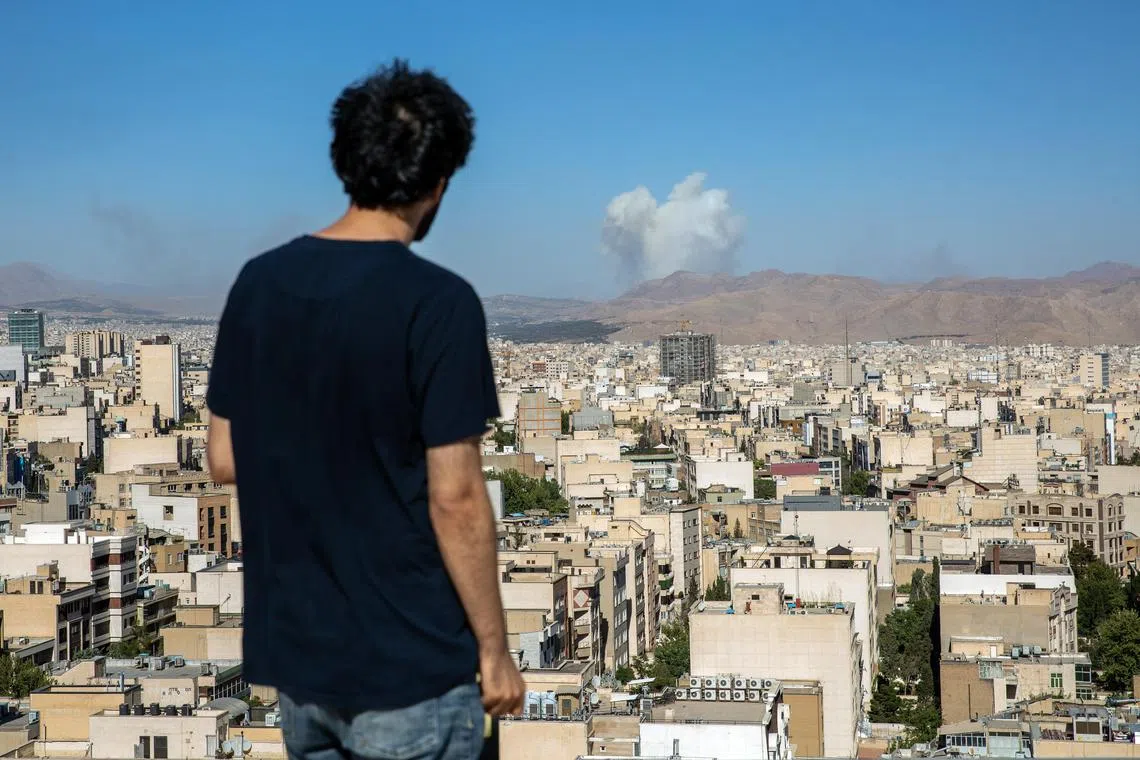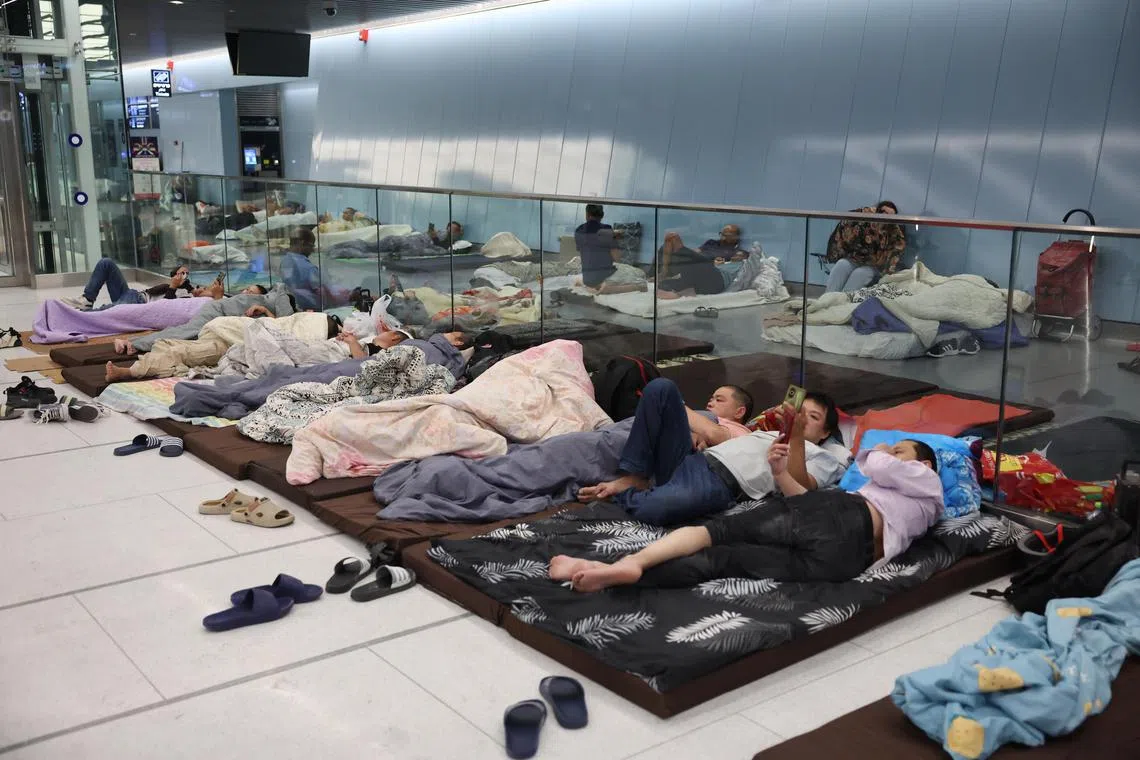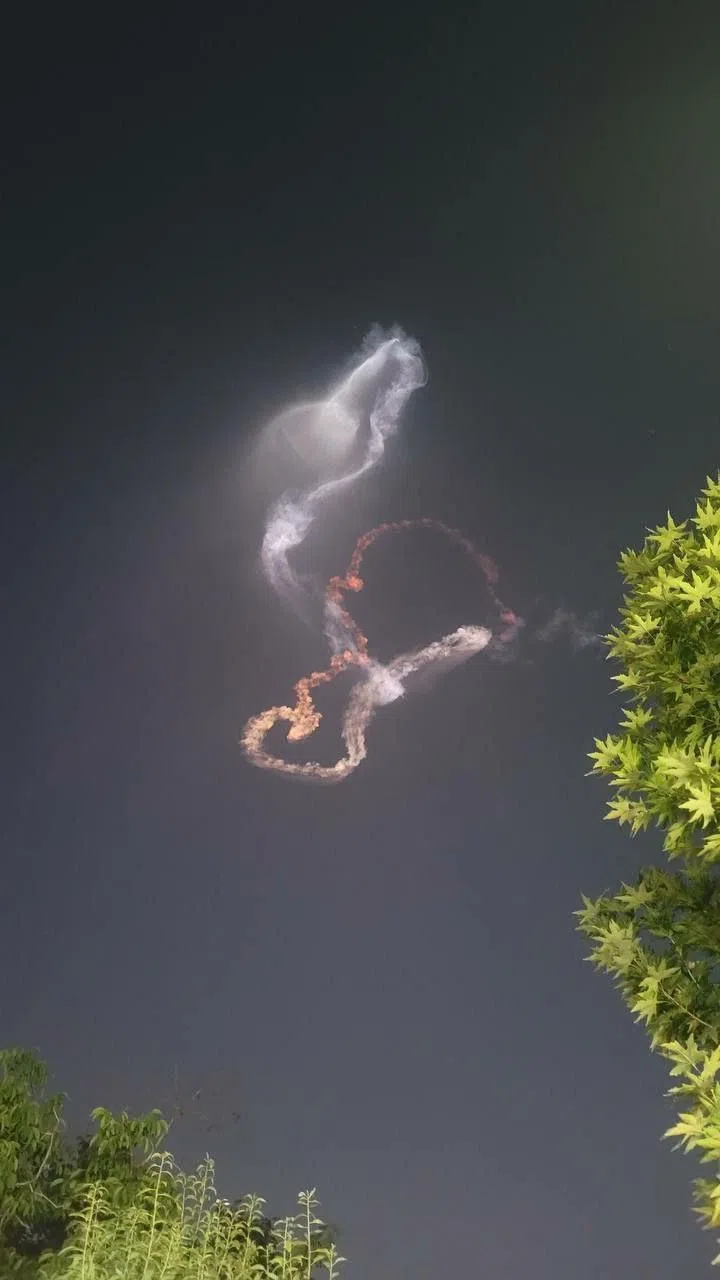Khamenei vows Iran will never surrender, hypersonic missiles target Israel
Sign up now: Get ST's newsletters delivered to your inbox

A man in Tehran watches as smoke billows into the air during an Israeli air strike on June 18, 2025.
PHOTO: NYTIMES
Follow topic:
TEHRAN - Supreme leader Ayatollah Ali Khamenei said on June 18 Iran would never surrender, with the country unleashing hypersonic missiles in a new wave of attacks against Israel on the sixth day of war between the longtime enemies.
The launch came hours after Israel said it had destroyed Iran’s internal security headquarters in Tehran, and as it reported a new wave of attacks targeting missile systems and storage sites in the country’s west.
Ayatollah Khamenei also warned the United States against becoming involved in the conflict, after US President Donald Trump appeared to flirt with the idea in recent days, calling for Tehran’s “unconditional surrender”.
“This nation will never surrender,” Ayatollah Khamenei said in a televised address, in which he called Mr Trump’s ultimatum “unacceptable”.
“America should know that any military intervention will undoubtedly result in irreparable damage.”
Ayatollah Khamenei, in power since 1989 and the final arbiter of all matters of state in Iran, had earlier vowed the country would show “no mercy” towards Israel’s leaders.
Iran’s state television reported the launch of Fattah hypersonic missiles, while the Islamic Revolutionary Guards Corps also announced the launch of so-called super-heavy, long-range missiles.
An Israeli military official, who asked not to be named, said on June 18 that Iran had fired around 400 ballistic missiles and 1,000 drones since June 13.
About 20 missiles had struck civilian areas in Israel, the official added.
Israeli Defence Minister Israel Katz said earlier that air force jets had destroyed Iran’s internal security headquarters, as AFP journalists in Tehran reported powerful explosions across the city.
He called the internal security facility “the main arm of repression of the Iranian dictator”.
Meanwhile, a London-based internet watchdog said Iran was in the midst of a “near-total national internet blackout” on June 18 after days of disruptions.

People spending the night in a Tel Aviv underground train station on June 18.
PHOTO: EPA-EFE
Iran later announced heavier internet restrictions
It first imposed internet curbs at the outset of Israel’s campaign
‘Unconditional surrender’
Mr Trump has fuelled speculation about US intervention, saying on June 18 that his patience had “run out” with Iran, but that it was still not too late for talks.
He later said he has not yet made a decision
A change in Iran’s government “could happen,” he told reporters at the White House.
A day earlier, Mr Trump had boasted that the United States could assassinate Ayatollah Khamenei, but would not do so, “at least not for now”
United Nations chief Antonio Guterres warned against any “additional military interventions” in the Middle East, saying they could have “enormous consequences” for the region and beyond.
Israeli Prime Minister Benjamin Netanyahu, however, thanked Mr Trump
‘Painful losses’
“We are striking the ayatollahs’ regime with tremendous power,” Mr Netanyahu said, in a televised statement.
“We are hitting their nuclear programme, their missiles, their military headquarters, the symbols of their power,” he added, acknowledging Israel had also suffered “painful losses”.

A handout picture showing the trail of a missile fired from Iran to Israel, in the sky over Tehran, on June 18.
PHOTO: EPA-EFE
Since June 13, at least 24 people have been killed in Israel
Iran said on June 15 that Israeli strikes had killed at least 224 people, including military commanders, nuclear scientists and civilians. It has not issued an updated toll since then.
Israel said its surprise air campaign was aimed at preventing Iran from acquiring nuclear weapons – an ambition Tehran denies.
Israel has maintained ambiguity regarding its own atomic activities, but the Stockholm International Peace Research Institute (SIPRI) says it has 90 nuclear warheads.
Beyond the deadly strikes, some Iranians have reported shortages in recent days.
Finding fuel has become a challenge, with long car queues waiting hours in front of petrol stations, a 40-year-old Iranian driver told AFP at the Iraqi border crossing of Bashmakh.
“There are shortages of rice, bread, sugar and tea,” he said, asking to remain anonymous for fear of reprisals.
“People are shocked and distraught, they don’t know what they should do,” said a car dealer in the Iranian city of Bukan who also asked not to be identified by his real name.
Centrifuges hit
Earlier, Israeli strikes destroyed two buildings making centrifuge components for Iran’s nuclear programme in Karaj, a satellite city of Tehran, the International Atomic Energy Agency said.
In another strike on a site in Tehran, “one building was hit where advanced centrifuge rotors were manufactured and tested”, the agency added.
Centrifuges are vital for uranium enrichment, the sensitive process that can produce fuel for reactors or, in highly extended form, the core of a nuclear warhead.
French President Emmanuel Macron on June 18 urged Israel to end strikes on targets in Iran not linked to nuclear activities or ballistic missiles, his office said.
Foreign governments have scrambled to evacuate their citizens
But some Israelis stranded abroad chose to return home on special flights.
“I decided to come back because the family is here, and I belong here, and unfortunately we get used to these fights and war, but we prefer to be here, to support as much as we can,” said Yaakov Bogen, a 66-year-old hotelier. AFP

